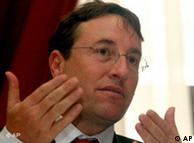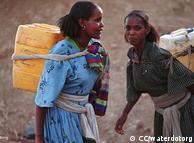Search Results for Tag: UNEP
What’s at stake at #COP19 talks in Warsaw?
What can the world expect from the next round of global climate talks in Warsaw in November? And will governments put money behind their climate pledges? Journalists from around the world had the chance to quiz Achim Steiner, head of the UNEP, in an online video conference organized by DW Akademie.
Web session with Achim Steiner (UNEP) from DW Akademie on Vimeo.
A stronger UNEP: Almost off the table?
Author: Kerstin Schnatz
How can we better tackle global environmental problems – such as the loss of biodiversity or air pollution? Many countries believe that the United Nations should have a bigger say in solving these problems – one of the most controversial issues at the Earth Summit at Rio de Janeiro, where over 115 world leaders come together to discuss global challenges.
The European Union for example favors an „upgrade“ of the United Nations Environmental Programme (UNEP) to the same level as more powerful UN bodies, such as the Food and Agriculture Organisation or the World Health Organisation.
But other nations are opposed to this change – including Brazil, host of the summit. According to non governmental organizations watching the Rio+20 negotiations closely, a full scale upgrade of UNEP is by now almost off the table.
German Environment Minister Peter Altmaier sticks to the European position:
Women Most at Risk from Climate Disasters
Women, particularly those living in mountain regions in developing countries, are facing disproportionately high risks to their livelihoods and health from climate change. That is the result from a new report entiteled “Women at the Frontline of Climate Change: Gender Risks and Hopes.“ The report has been released at the UN Climate Change Conference (COP17) in Durban by the United Nations Environment Programme (UNEP).
Investing in low carbon, resource efficient green technologies, water harvesting and fuel wood alternatives can strengthen climate change adaptation and improve women’s livelihoods, says the report. In parts of Asia and Africa, where the majority of the agricultural workforce are female, the impacts of such disasters have a major impact on women’s income, food security and health.

Achim Steiner, United Nations Environment Programme (UNEP)
“Women often play a stronger role than men in the management of ecosystem services and food security. Hence, sustainable adaptation must focus on gender and the role of women if it is to become successful”, said UN Under-Secretary General and UNEP Executive Director, Achim Steiner. “Women’s voices, responsibilities and knowledge on the environment and the challenges they face will need to be made a central part of Governments’ adaptive responses to a rapidly changing climate.” According to the report, women in communities vulnerable to climate change are often more likely than men to lose their lives during natural disasters, due to poor access to coping strategies such as basic lifesaving skills or cultural factors that restrict the mobility of women.
More on that issue on ideasforacoolerworld.org/en
Glaciers melting fastest in South America & Alaska

Or the whole report as an e-book here…





Feedback